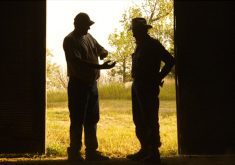Being heard feels good. It’s like a massage,” says Cheryl Weber Good. “Our need to be heard is so big … to know that someone is sharing our journey and that we are not alone.”
Weber Good, who farms near New Hamburg, Ont., with her husband, serves as a listening companion.
Read Also

Farm & Family – Feb 27 edition
Last week, we highlighted part one of a two-part series by GFM associate digital editor Geralyn Wichers about why you…

“A listening companion is not counselling,” she says. “It’s being there as a person hears their own heart. It’s feeding back the wisdom that might be underneath, that we dig out together.”
On her farm, in addition to the crops they grow, Weber Good offers listening sessions in an old stone house that served as the summer kitchen long ago. She says there’s something about being on an old farm, surrounded by stone walls, that people respond to, “allowing their thoughts to be expressed, often surprising themselves with what comes up. They find wisdom within.”
The telling of the story may help the speaker to process difficult emotions which can result in a shift in their thinking and a calming of emotions and healing, continues Weber Good. As Brené Brown, the renowned University of Houston social science researcher, says: “When we feel heard, cared about and understood, we also feel loved, accepted and as if we belong.”
Deep listening can also reduce miscommunication. It can help us to see another point of view, too, and strengthen relationships and trust.
It was after recovering from a long bout of depression that Weber Good sought out training to help her be a better listener. Although living through depression was very difficult, she says she learned many lessons and received the gifts of empathy and compassion.
Weber Good says people may shy away from deep conversations because they aren’t sure they’ll get it right. But, she emphasizes, “there is no perfect listener. Human relationships are messy and we’re going to mess up.”
While most of us are already better at listening than we think, Weber Good offers some suggestions. She insists these are not dos and don’ts since they are situation-dependent, but they are something to be mindful of.
In the “Not helpful” (but may be appropriate at times) column, Weber Good includes interrupting, offering advice, mind reading, judging, debating, disagreeing, changing the subject, multi-tasking, “one-upping” (“if you think that’s bad, I’ve got it worse”), and day dreaming about something else.
In the “What may be helpful” column, Weber Good lists being present, curious, sincere, patient (letting them finish), paraphrasing (“if I hear you right …”), encouragement, validating (“I hear you”), staying as neutral as possible, maintaining confidentiality, watching your own sharing (it can be helpful or may derail), and being okay with silence.
Asking some quality questions can be useful. These are situation-dependent but could include “What is behind that issue?” or “How is that working for you?”
Listening also involves being aware of non-verbal cues such as posture, facial expressions and eye contact.
If you don’t have the time to give someone your full attention, there’s nothing wrong with deferring the conversation to another time. “We cannot always have the time or be in a space where we can listen well and that’s okay,” says Weber Good.
Weber Good also has some self-care advice for would-be listeners. She prepares herself mentally before a listening session by checking in with herself to see how she’s doing. “Am I tired? Stressed? Distracted?” Once she is aware of her state of mind, she uses intention as a way of grounding herself. “I ask for energy, focus or whatever is needed.” When listening, she will return to that intention throughout the session.
Setting clear boundaries is another self-care strategy for listeners, says Weber Good. To prevent herself from being overwhelmed by the emotions of the speaker, she envisions that she is holding a container for the speaker to empty their stuff into rather than having it dumped on her. She honours and respects what she hears, but “does not let it in” so that it doesn’t have an impact on her in a way that is draining. At the same time, she balances this with compassion and empathy, which are about how it feels for them.
Practising our listening skills is needed nowmore than ever, says Weber Good. With the pandemic, we have experienced isolation, our social skills may be rusty, relationships may be strained and counsellors are overloaded.
Through our listening we make a valuable contribution to humanity, says Weber Good. Even our listening during our day-to-day interactions with people like the cashier at the grocery store, a hiker on the trail or a co-worker are valuable and needed. “There’s so much loneliness out there. Healing is in the one-on-one conversations.”
Find a path forward when there’s disagreement
If it seems to you that people have become increasingly polarized, you’re not alone.
Dr. Laura Cavanagh, a professor of psychology at Seneca College’s King City, Ont. campus, says that the echo chambers created by social media tend to lead to polarization of communities.
People have always seen the world through different lenses, Cavanagh explains. Nor is this a bad thing, except that social media and other online vehicles exacerbate this trend. In the digital world, algorithms define each person’s apparent preferences, and then feed them more and more information that confirms what they already think.

“You don’t realize you’re in an echo chamber,” says Cavanagh, but the result is that we are becoming less tolerant of differing views.
Research in cognitive psychology has shown that humans naturally have a confirmation bias, which means we tend to seek out and pay greater attention to information that agrees with what we already believe, adds Cavanagh. Interacting exclusively with others who share our views leads to what psychologists call groupthink, a phenomenon in which the opinions of members of a group tend to become more extreme and rigid over time.
“It’s very difficult to avoid this when we live so much of our lives online. And when these differences relate to core values, it can feel very uncomfortable,” says Cavanagh.
We need to get better at listening and finding ways to move forward when we have strongly held differences of opinion, says Janet Schmidt, a Winnipeg mediator who also teaches courses for the non-profit organization Mediation Services.
With more than 30 years’ experience as a mediator, Schmidt has had ample exposure to the ways in which communication and relationships break down when we aren’t in agreement. Below, she shares some of those negative patterns and her tips for overcoming them:
When there is a difference of opinion, it can be because we are often focusing on our reply instead of listening. Better is to give the person the space to talk and let them finish making their point.

In addition to listening, we also need to signal that we are listening. We have all had times when we know someone isn’t taking in what we are saying. To show that we are listening attentively, Schmidt suggests we ask open-ended, curious questions such as “Can you say more about that? How did you move from here to there? I don’t quite understand what you meant when you said this.” Questions like these are non-judgmental and help you drill down to the meaning behind the words.
When the speaker finishes, we need to show that we have captured the essence of their argument by summarizing and paraphrasing what they have said. This shows that we were listening and have understood.
At this stage it’s common for a nuance to be corrected, which in turn leads to a better understanding of the argument. This goes a long way in helping us move forward. In Schmidt’s experience, most people love to be understood, even more than agreed with, and it can be this feeling of being understood that actually results in building a stronger connection.
If, at this stage, you still aren’t in agreement, you can let the speaker know by responding with something like: “That’s helpful. I appreciate your honesty. I understand you, and what you need to know is that I see this differently. Are you willing to hear me out?”
By going through this back-and-forth process, people will often find areas of common ground where they agree on some of what the other person has said.
Through this sharing, it is also possible for people to gain new insights which could lead to them changing their minds. “This isn’t anything to be embarrassed about. We’ve all changed our minds once we have new information or insights. It’s a sign of maturity,” says Schmidt.
However, if conversations involve name-calling or aggressive behaviour, you can draw a boundary to protect your mental health, says Cavanagh. Such boundaries could include having no contact at all, or rules around contact such as “I only take this person’s calls during the day but not in the evening.”
Resources
- On-line and in-person training workshops on conflict resolution offered by non-profit Mediation Services in Winnipeg.
- You can reach Cheryl Weber Good through her Facebook page “Exploring our Inner Journey” or via Google.
















